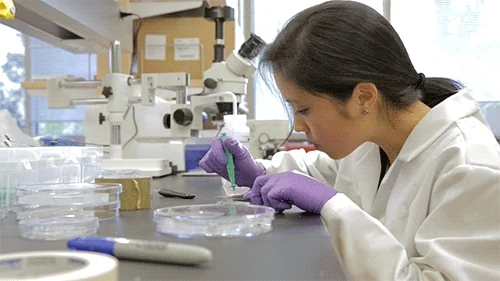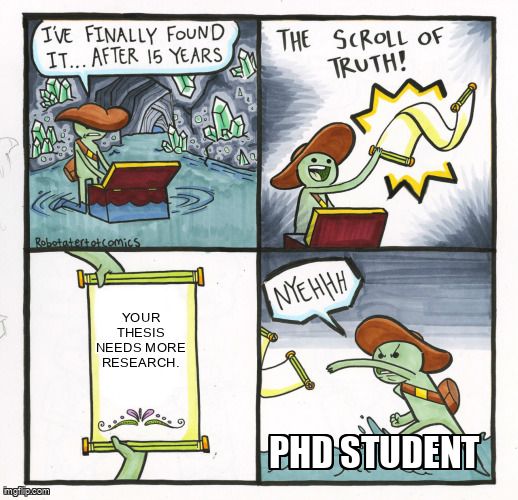After I finished my bachelor's degree in biochemistry, I was beyond excited to start a PhD. I wanted to research viruses, specifically HIV. Though I didn't end up working on HIV, I got to research viruses within the context of cystic fibrosis (a genetic disease). I joined the microbiology department, excited to work towards becoming a professor.
Confession: I quit my microbiology PhD program just weeks after becoming an official doctoral candidate. I have zero regrets! I learned a lot, met some great people, and finished with my master's degree. A STEM PhD just wasn't the right fit for me. I do wonder if I would have had an easier time if I had known more when I started.
Even though a PhD wasn't the right fit for me, I want you to get the most out of your STEM PhD. So here are 5 things I wish I'd known going into my PhD program in the United States.

1. You'll spend more time doing research than going to class.
Each STEM PhD program is different. Some require you to complete more classes and some require fewer. What all STEM PhDs programs have in common is you'll spend a lot of time doing research! Your research will be the basis of your thesis.
 To complete your research, you'll have to find a research advisor. This faculty member will guide you as you complete your research and choose your committee members. You'll be working with them for the next several years. So be picky about who you choose as your research advisor!
To complete your research, you'll have to find a research advisor. This faculty member will guide you as you complete your research and choose your committee members. You'll be working with them for the next several years. So be picky about who you choose as your research advisor!
2. But you WILL need to study!
You'll need to review class material to do well on your comprehensive exam.
Comprehensive Exam Format Varies
During your STEM PhD program, you'll have to take a comprehensive exam (aka "comps") after you complete your classes. The format of the exam varies so pay attention to instructions!
I had to write a fake research proposal that was "close" to my thesis topic. Then I had an oral exam about it in front of my committee.
My Mistake
This biggest mistake I made during my PhD was thinking the comprehensive exam was separate from my classes. I should have focused on studying information from my classes.
I spent too much time studying background information about my proposal topic. My committee almost failed me because I couldn't answer simple questions related to the virology class I took.
Don't make my mistake! Brush up on the basics from your classes, even if your comprehensive exam format feels disconnected.

3. Take extra steps to learn how to teach.
Do you want to be a professor someday and learn how to teach? That was my original plan when I started my PhD. If you're lucky, you might be assigned as a teaching assistant (TA) for a professor who can mentor you in student-centric teaching. If you're not lucky, you might have to go above and beyond to learn how to teach.
If you want to learn to teach:
Seek mentorship from professors whose teaching skills you admire.
Take a class on teaching.
Complete a whole teaching certificate if offered at your university!
Since STEM PhDs are focused on research, you might have to convince your research advisor that teaching is an important skill for you to develop.
Quiz
What additional teaching skills should you learn if you want to be a professor? Select all that apply:
4. Embrace not knowing when you'll graduate.
Unlike your bachelor's degree, graduation requires more than just taking a bunch of classes. Most STEM PhDs require you to write a doctoral thesis (or dissertation). You'll spend years researching your topic. Sometimes your research won't go as planned, and it will feel like you aren't making progress.
Your committee will tell you when you have enough research to start writing your thesis and schedule your thesis defense. So be persistent. Work hard. But try not to stress about when you'll graduate.

5. It's okay to realize a PhD isn't the right fit.
Let's say you start your STEM PhD program and realize it isn't for you. You hate doing research and can't do it for another 2-4 years. Or your career goals have changed and you don't need a PhD. That's okay! Attempting a PhD will help you develop skills like:
Resilience
Data analysis
Embracing critique
Project management
Public speaking
If you decide to leave your PhD program, celebrate! You made a hard decision, but it was the right one for you. Depending on your program, you might be able to exit with a master's degree.
Quiz Time
Two years into her PhD program, Sandra realizes she doesn't want to be a professor. She wants to work for a pharmaceutical company researching cancer drugs. Should she:
A. Master out of her PhD, since she doesn't need a doctoral degree and can make more money sooner.
B. Continue working on her PhD because her pay will be higher in the long-run.
Quiz
Which choice should Sandra make? Choose all that apply:
Take Action
 Hopefully, you have a better idea of what you're getting into if you decide to do a STEM PhD program. Only you can decide if a PhD is a good fit.
Hopefully, you have a better idea of what you're getting into if you decide to do a STEM PhD program. Only you can decide if a PhD is a good fit.
Here are some Bytes to check out and some action steps you can take:
Your feedback matters to us.
This Byte helped me better understand the topic.


